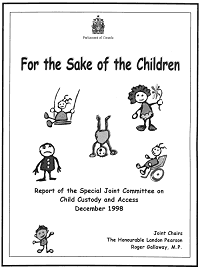Shared Parenting Information Group (SPIG) UK
- promoting responsible shared parenting after separation and divorce -
Canadian report recommends shared parenting
 The Canadian Special Joint Committee on Child Custody and Access has issued a report
'For the Sake of the Children' [1]
making 48 recommendations[2]
for the reform of Canadian Divorce Law.
The Canadian Special Joint Committee on Child Custody and Access has issued a report
'For the Sake of the Children' [1]
making 48 recommendations[2]
for the reform of Canadian Divorce Law.
The main proposals are:
- The terms 'custody' and 'access' to be replaced by 'shared parenting'
- Divorcing parents to be encouraged to develop 'parenting plans' to share the parenting functions and foster and maintain relationships with the wider family
- Divorcing parents to be encouraged to attend mediation
- Divorcing parents to be required to attend education programs to help them become aware of the post-separation reaction of parents and children, children's developmental needs at different ages and the benefits of co-operative parenting after divorce
- The common law 'tender years doctrine' be rejected as a guide to decision making about parenting.
- Both parents of a child receive information and records in respect of the child's development and social activities, such as school records, medical records and other relevant information. The obligation to provide such information should extend to schools, doctors, hospitals and others generating such information or records, as well as to both parents, unless ordered otherwise by a court.
The report also puts forward a list of criteria to be used in determining the best interests of the child:
- The relative strength, nature and stability of the relationship between the child and each person entitled to or claiming a parenting order in relation to the child;
- The relative strength, nature and stability of the relationship between the child and other members of the child's family who reside with the child, and persons involved in the care and upbringing of the child;
- The views of the child, where such views can reasonably be ascertained;
- The ability and willingness of each applicant to provide the child with guidance and education, the necessaries of life and any special needs of the child;
- The child's cultural ties and religious affiliation;
- The importance and benefit to the child of shared parenting, ensuring both parents' active involvement in his or her life after separation;
- The importance of relationships between the child and the child's siblings, grandparents and other extended family members;
- The parenting plans proposed by the parents;
- The ability of the child to adjust to the proposed parenting plans;
- The willingness and ability of each of the parties to facilitate and encourage a close and continuing relationship between the child and the other parent;
- Any proven history of family violence perpetrated by any party applying for a parenting order;
- There shall be no preference in favour of either parent solely on the basis of that parent's gender;
- The willingness shown by each parent to attend the required education session; and
- Any other factor considered by the court to be relevant to a particular shared parenting dispute.
References
- For the Sake of the Children - report of the Special Joint Committee on Child Custody and Access, December 1998
- Recommendations of the report
- Joel Miller's Family Law Centre - an excellent commentary and index to the report
Last updated - 29 March 1999
SPIG Home Page

